Catharine Pendrel: Getting used to rainbow stripes
In depth chat with the world champion heading into Olympic season
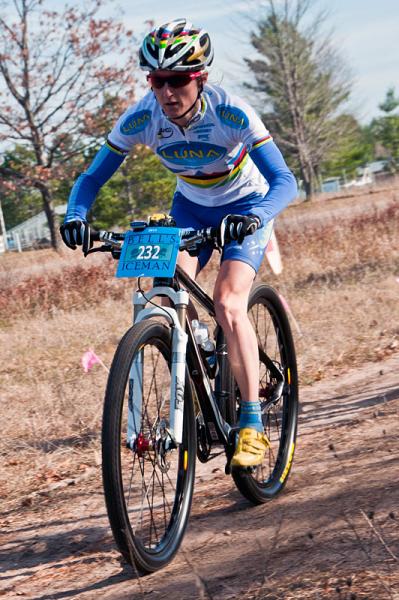
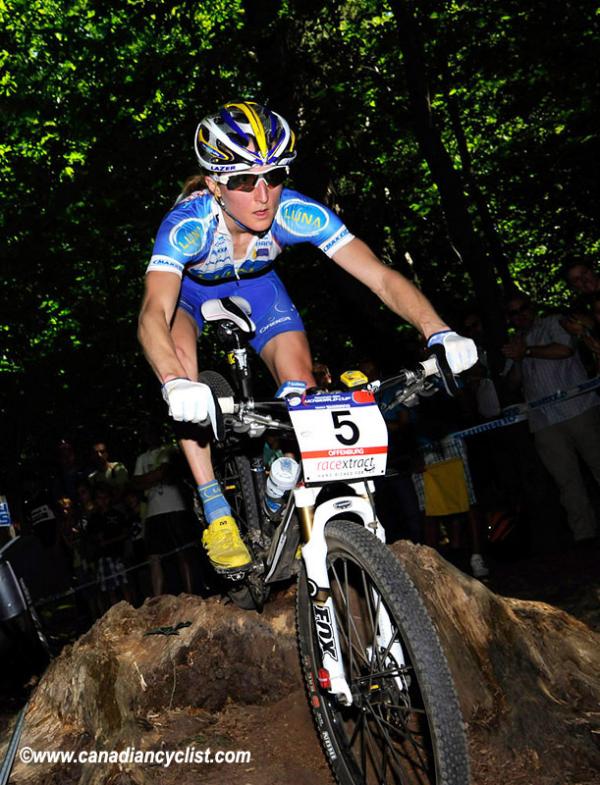
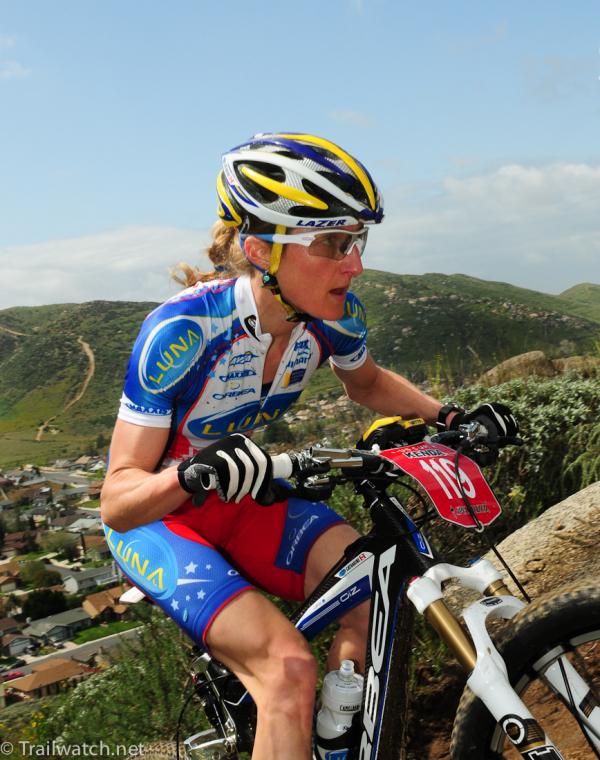
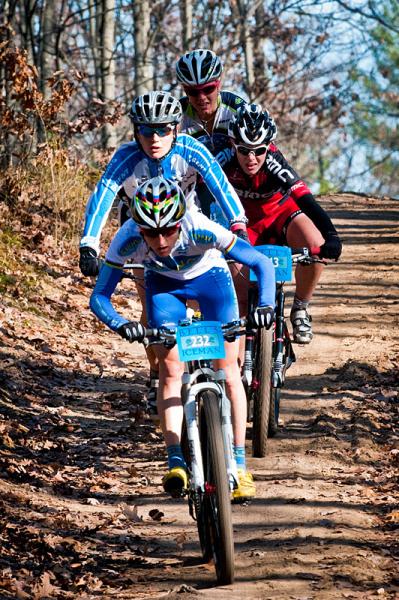
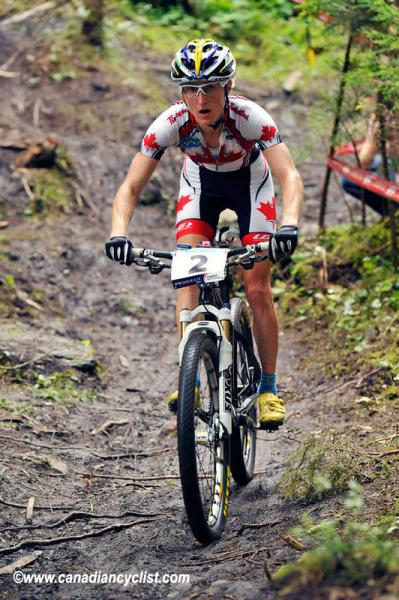
Becoming world champion will change your life. Or so that's what people say. But cross country mountain bike world champion Catharine Pendrel, 31, says she is up to business as usual during this pre-season training period.
"It's easy to feel satisfied with my last season, but life is the same. A lot of people think it must be crazy different, but it's pretty much the same. Life is good," she said.
As reigning world champion and runner-up in the 2011 UCI World Cup, the blonde Canadian rider is a favorite for the 2012 London Olympic Games. She's already busily training in advance of the season; when Cyclingnews spoke with her, the three-time Canadian national champion was logging some early season miles in Palm Springs, California, with the Canadian National team.
"The key to Olympic success is not making major changes. If you found what works, you have to stick with it," said Pendrel. "That being said, there are minor changes you can make. I am making sure I have good training blocks between races. For the first two World Cups, I'll have time in between to train. Like last year, I want to not be firing on all cylinders in March and April. Hopefully in August I'll be firing at 100 percent." The Olympic race is on August 11.
Prior to the World Cup season, Pendrel will test her legs with round one of the US Pro XCT: the Mellow Johnny's Classic in Dripping Springs, Texas. "I've never done that race before. Aside from that, it's wait and see as to whether or not I need to stretch my legs more."
What happens next is the UCI World Cups. That portion of the season begins on March 17-18 in Pietermaritzburg, South Africa.
The first four World Cups, which run up through May 2012, will be used in finalizing Olympic team selection. Contrary to what many have thought, Pendrel does not have a spot on the Canadian Olympic team locked up.
The latest race content, interviews, features, reviews and expert buying guides, direct to your inbox!
"As far as I'm aware, I'm not pre-selected. There is nothing in Olympic criteria that says that I am." Pendrel knows that she has to ride well during the early season to guarantee her spot, but is aware that her recent international success will count in her favor. Her likely challengers for the two spots on the team will be Marie Helene Premont and Emily Batty.
"My federation will weigh past performances to allow me to not have to fight for a spot in March. I have to keep my results up and prove that I'm consistent. I have to have faith in that my federation is trusting me to do what I need to do to perform best at the Olympics. That's where a lot of sport funding comes from. I will plan for my base level performance to be high enough to qualify me."
The Canadian Olympic team should get decided around the first week in June.
Background: From fair weather athlete to pro racer
Pendrel did her first race two weeks after she started riding in 1997 in New Brunswick, but she said she didn't get serious about racing until 2003.
"I moved to British Columbia and was physically active through a whole winter. Before that, I was an April through September athlete. I met my coach and my future husband that year."
For two years, she raced for the Norco Factory team. Her big breakthrough came in 2008, when she joined the Luna team. "That was my first paid position," she said.
Making the jump wasn't easy. A racer has to get international results before she can get on an international team, but it's hard to get international results without the support of an international team.
"In 2007, I'd get to a World Cup and try to find someone to hand me a bottle (during the race). I had to get to Worlds before I could get a contract with Luna. You have to prove yourself before people will invest in you. This gap can cause the sport to lose riders, but it's also good to you have to work for it, too."
"I think joining Luna was huge for my confidence and my drive. If I'm going to be on the Luna team, I am going to be fast. You have to put in the quality of effort and training to belong on that team. Even though I'm now one of the team's top performers, I want to uphold our image as being some of the best women in the world. You're in a motivated enivronment with a good training ethic and part of an awesome sport. If you have a bad day, one of your teammtes will have a good day... so there is always something to celebrate."
There's been some fuss lately about the UCI and women's road cycling and what should be done to make pro road cycling a better profession for women. When asked about the state of affairs in pro women's mountain biking, Pendrel was more optimistic.
"Rarely do you know what others actually make, but in general, there is less big money in mountain biking. To be able to put together a team, you don't need as many riders, so it's easier to be more equitable. I'm happy with the Luna team, and we have an owner who is committed to a women's team that lets us be on par professionaly with men."
"There are several teams out there that do really value women's racing. The format of mountain biking is better, too - we race the same day and we don't feel like we're a separate show. I think mountain biking has done good work so far to make it fairly equitable. Still, I'd love to see more opportunities for both males and females to race professionally. I think the national federations have stepped in somewhat to help with the gap up to racing pro."
A look back at 2011
The memory of her day of glory at the mountain bike Worlds in Champery, Switzerland, still stands out in Pendrel's mind.
"It was so exciting to be so in the moment and feel like everyone else was sharing my moment. It was such incredible energy for the day. For me, for Luna, for Canada."
Her win came at the end of a season that she described as "slightly slow" even though on paper, her results looked impressive, including several World Cup wins leading up to the Worlds.
"Results don't tell the whole story. I had two World Cups that were slightly off - finishing fourth and seventh. For the seventh, I went from third to seventh on the last lap when a group of four caught me. My coach and I had planned for me to be more on form later. Last year's schedule allowed for me to do more high quality training in during the summer. That July block helped me get that late season form. After nationals, I didn't lose a race."
She won the late season World Cups in the Czech Republic and Val di Sole. Both racers taught her something.
"In one of those races, I lost time at the start, then got up to Julie (Bresset), then made a mistake. I lost 20 seconds again and caught back up. It was winning that battle when things don't always go your way but you have to keep fighting back. Mentally that was a good thing going into Worlds and the Olympics. in those races, you know you're going to have to fight back at some point."
"In Val di Sole, it happened again. I had a minute lead, had a crash, and was left with a crooked stem. My gap dropped down to a 15-second gap, then I had to build it up to a minute again. Sometimes the battle is more against yourself and staying in the race mentally."
One of Pendrel's other successes in 2011 was winning the Olympic Test Event in late July. The race was held on the course that will host the Olympics and gave her some insight into the big day.
"I will not presume that the girls were on their top form at that event. A lot of people don't want to win a test event because it puts too much pressure on them. My mentality: there will be pressure anyway so why not try to win?" Pendrel called the course good for herself and for Luna teammate Georgia Gould.
"I learned that the course can be more decisive than I thought. Initially, I thought course would favor road racing experience and flatland power. There is a decisive physical climb in it and the soil conditions are tricky to maintain tractions so there is a lot of making adjustments to put down power and corner in non-optimal traction conditions. You'll still have to bridge up gaps and pay for making efforts and you still have to figure out where you can put it down and where you can recover."
The Olympic year
If past experience is any indicator of what cycling fans will see in 2012, the Olympics will again loom over the season and cause some interesting differences in the racing that happens relative to non-Olympic years.
Pendrel said she doesn't think the Olympics will affect the first four World Cups, but she predicted the North American World Cups - later in the season - might suffer.
"People need to qualify, and most nations will rely on the first four World Cups. The North American World Cup races will be hurt the hardest. In general, the Euros are less likely to travel to North America if they don't have to. It could hurt our races, but we could use it to our advantage. If there are less people, we'll get good points, good results to help our confidence and starting position."
"It will also be interesting to see if people will do the last World Cup at altitude two weeks before the Olympics."
The Olympics may also affect the UCI's decision to elevate the status of the fledgling cross country eliminator discipline. Pendrel is intrigued by the eliminator, but not so sure she'll race it in 2012.
"I think it's great to be expanding our sport and making it more than one event in a weekend. It gives different riders a chance to shine. The best World Cup racer might not be best eliminator racer. I'm glad they decided not to make it mandatory for World Cup points this year. I'm not going to participate this year, but I am looking forward to adding that in next year."
As for racing the eliminator in its first running as a world championship event, Pendrel said, "That thought hasn't even crossed my mind. I'm thinking that after the Olympics, I'll want a mental break."
Perhaps she would be more interested in racing if the new shorter event were a short track instead? She said, "I'd love to see them bring in the US-style short track because it's a fantastic format and good spectator racing."
Ever the gracious champion, Pendrel is well aware of her competition for an Olympic medal. She pointed to Maja Wloszczowska and Julie Bresset as the two to watch.
"Maja has the proven ability to be there on the day. When she is at her best, she is very strong. Julie has obviously shown that she can be there on the day and consistently day to day. She's been riding almost as long as I have, but she's still newer to racing the best in the world. We should continue to see her improve. Because of her age, she's very motivated and has lots of good energy, but she has shown the maturity to not get overwhelmed and to be the best."
In 2008 in Beijing, Pendrel finished in fourth place, just missing out on a medal. The chance to try again so soon is clearly motivating her.
"I'm excited. It's going to be a cool year to see how things shape up. You get people who put together amazing years in an Olympic year. We'll see ... does Marie Helen (Premont) ride like she did in 2007-2008? How does Willow (Koerber) come back off of her pregnancy? Every country will have their story. People will have heartbreaking seasons and some people will be flying high. We'll see how it all comes together."
Sue George is an editor at Cyclingnews. She coordinates all of the site's mountain bike race coverage and assists with the road, 'cross and track coverage.